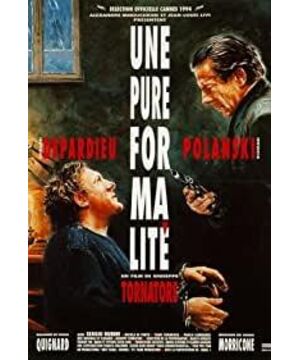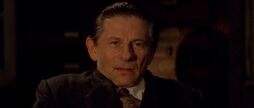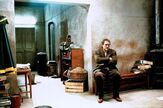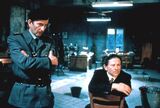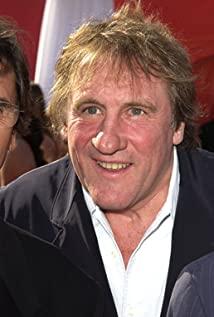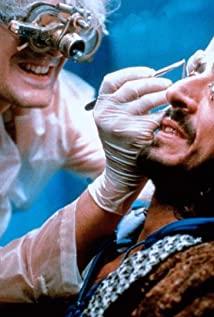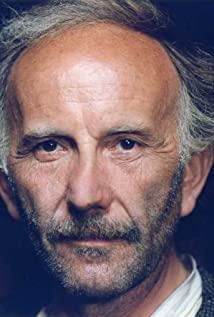For a work, it is always easier to "destroy" than to "achieve". Don't over-praise it, and don't over-depreciate it. Good works of art often come from good reputation.
No. 7 Rating: 7.87
Synopsis
On a rainy night, a man (Gérard Depardieu) runs through the woods.
He was stopped by a group of people and taken to a dilapidated house.
The leader didn't let him leave, and didn't allow him to make a phone call. He just sat and said to wait for the sheriff to come.
The man became furious, knocked over a hot milk that an old man brought him, and even bitten a police officer's hand.
At this time, the sheriff (Romain Polanski) finally arrives, and he takes the man to a leaky office and asks him where he came from.
The man claimed to be Onof, a well-known writer.
Everyone at the scene laughed, obviously they didn't believe that the embarrassed man in front of him would be the great writer Onof.
Fortunately, the Sheriff is a fan of Onof, and he can read all of Onof's writings.
When the man recites passages from Onof's novel, the sheriff finally recognizes him, only because of his shaved beard, which is not quite the same as the picture.
The sheriff's attitude changed drastically. Not only did he make coffee for Onof, he also found some clean clothes for him to change into.
Onof went to the bathroom and took off his clothes, but unexpectedly found blood stains on his shirt, but he couldn't remember what happened before.
He tore his shirt and tried to flush the blood-stained rag down the toilet, but there was no water in this place.
He had no choice but to swallow the rags into his stomach.
But what he didn't know was that nothing he did escaped the eyes looking in through the keyhole outside the door.
After changing his clothes, Onof offered to let the sheriff send him a car to take him home, but was told he needed to answer a few questions before leaving.
The two came to the office, and the sheriff told him that as long as he could remember what he had done all day today, he would be fine.
The memory flashed back in Onof's mind, waking up in the early morning... He told what happened in the day, but he couldn't remember what happened after 7 pm.
The sheriff didn't believe Onof's words, he changed his attitude and began to treat Onof with the way of interrogation.
It turned out that a person was killed not far from Onof's house tonight, and the time coincided with the lost timeline in Onof's memory.
The deceased's face was severely damaged, and his identity was still a mystery. Obviously, the sheriff suspected that Onof was involved in the murder.
During the questioning process, Onof's foreword was incoherent, his logic was chaotic, full of loopholes, and he even tried to escape.
However, the sky net was full, and he didn't run far before he was caught again.
In the following interrogation, Onof showed more clues, and he even accidentally revealed the identity of the deceased.
The shocking truth gradually emerges...
Video Analysis
It's hard to imagine that this is the work of Giuseppe Tonadore, it's more like Roman Polanski. A scene, a few people, a few dialogues, a dramatic film, very similar to Roman Polanski's Immoral Judgment in the same year.
The film is divided into two parts. The first part is suspenseful and thrilling. The director introduces the plot through rainy nights, mysterious people, and murder cases, and adds a lot of flashbacks to create a strange atmosphere, and then continues to attract the audience through wonderful dialogues. In the second half, the two protagonists come and go to push the film to a climax, but the real essence is the confessional monologue of Onof. At this time, the theme is about to come out, and the ending is even more moving.
The writer Onof was an orphan. After his mother gave birth to him, he abandoned him. Living in an orphanage since childhood, he was influenced by the homeless Hobin and began to like writing. I believe that he really liked writing at the beginning, he loved art, otherwise he would not have achieved great success, so what made him change?
After becoming famous, Onof found that writers were not as simple as he thought. He said, "If writers knew what kind of people their works would end up coming out of, they would definitely chop off their hands", stating that In his eyes, many people pretend to understand and use ignorance to arbitrarily evaluate the works carefully created by artists.
He satirized the media, "flashlights, news features, TV, they hide more than they reveal." In order to attract the attention of the audience, the media often write what they want to write, and the so-called truth is just an appearance, and the direction of public opinion can even be To dominate the success or failure of a work or a person.
He mocked God as a second-rate writer, "It's not hard to believe in God, I've believed in him many times, but I must say, I'm often ashamed of him, and he would have had a chance to be a great man if he had just kept on writing scenes. "The writer's", in addition to writing scenes and people, this shows that he believes that the people created by God are failures and stupid, which is a metaphor for Onof's disappointment with the people around him.
He kept wanting to make a phone call, and we didn't know until at last that it was Paula, the woman he left 20 years ago, the only one he loved. Although there is no direct explanation in the film, I think it is probably because of his career that Onof left without saying goodbye and married his agent, which shows that he does not love his second wife at all.
In the film, the old man once said, "I've been here for 15 years, I feel very good, I won't go to the city, I won't die", this place leaks water and electricity, there is nothing, what's so good? It is quiet here, no one is disturbed, and there is no pressure, which is why Onof wants to live in seclusion. I believe the agent and the editor put too much pressure on him to write, he said, "You don't write because you're inspired, you write because you can't do anything else", and it's been stated here that he grew up as a child The hobby of writing has become forced to write, very ironic.
Isn't film also art compared to writing? I believe that as a director Giuseppe Tonadore must have his own reflection in it, from his childhood love to the compromise he had to make in order to adapt to the times, facing the slander of the ignorant and unscrupulous media, he must You have to have a strong heart to face it. Compared with many "fallen" directors, in my opinion, Giuseppe Tonadore has been very successful in sticking to his art.
At the end of the film, the sheriff dumps a large stack of photos on the table and asks Onof to examine his life, which is a touching moment. What will be left of our life at the end, what will remain in your limited memory. Then, Onof found the turning point of his life and the cause of his depravity. I think the irony here is those speculators who steal other people's original creations. When you choose to speculate, you will lose your creative ability forever.
In the end, Onof took a picture of himself when he was a child. It was a young man who really loved writing, was full of longing for the future, and wanted to devote himself to art all his life, but he no longer knew it.
How many people we have met in our life, how many things we have done, how many places we have been to, no one can remember everything, but I think the most important thing to remember is the ideal in our heart at the beginning, look at life, do not forget Beginning.
View more about A Pure Formality reviews


